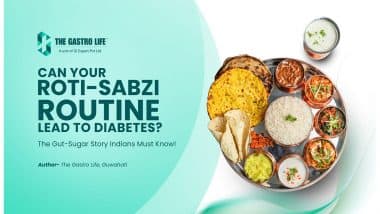India PR Distribution
New Delhi [India], May 1: In most Indian homes, food is more than nourishment -- it's tradition, love, and comfort. But as diabetes becomes alarmingly common across India, many question: could our beloved roti-sabzi routine be part of the problem?
It's a common scenario where people come to a doctor's clinic and declare proudly: I don't take rice anymore. Rather, I am taking oats, dalia, etc etc.
This blog breaks down how everyday eating habits affect your gut health and blood sugar levels, and why understanding the link can be a game changer -- especially for urban Indian lifestyles.
The Sugar Spike Behind Everyday Meals
Our meals, though simple, are often overloaded with carbs -- white rice, chapati made from refined wheat, fried sabzis, sugary chai -- and very little fiber or protein to balance things out.
This leads to rapid spikes in blood sugar, especially dangerous for those at risk of type 2 diabetes. With increasing sedentary lifestyles, especially in cities, these spikes happen more often and are harder to control. A rising number of cases of obesity is also contributing to altered metabolism within the body. With urbanization, there is also a sharp rise in stress level at all fronts which can be detrimental for gut health.
Why Your Gut Health Matters in This Equation
Your gut -- often called your "second brain" -- plays a crucial role in regulating how your body digests food and manages blood sugar. The gut microbiome, a mix of good and bad bacteria, helps in breaking down carbs, reducing inflammation, and improving metabolism.
But when this balance is off -- because of stress, processed foods, or erratic eating -- it can lead to insulin resistance, bloating, acidity, and even weight gain. In patients with diabetes there is a change in gut homeostasis, which can alter neurotransmitters in the gut.
Common Indian Habits That Might Be Harmful
Here are a few eating patterns many Indians follow that could unknowingly disrupt your gut and sugar levels:
* Drinking chai with too much sugar multiple times a day.
* Relying on refined carbs like white bread, white rice, or biscuits.
* Skipping fermented foods like curd or kanji that help gut bacteria.
* Not including protein-rich foods in everyday meals.
* Eating late dinners and sleeping immediately after.
So, Is Our Roti-Sabzi Bad?
Not at all! The roti-sabzi-dal combination can be very healthy, if balanced right. The key is portion control, variety, and adding more fiber and protein.
Instead of three rotis, try two with a bowl of dal and a plate of sabzi. Switch wheat with millets like bajra or jowar. Add curd or a small portion of paneer or egg to your lunch. Simple changes, big difference.
The Role of Indian Spices and Fermented Foods
Many traditional Indian spices -- like turmeric, jeera, hing, and ajwain -- actually aid digestion and reduce inflammation. Similarly, fermented foods like idli, dosa, kanji, and homemade pickles can help nourish your gut.
Unfortunately, modern lifestyles often replace these with packaged or overly refined food options, which lack the same benefits.
A New Approach to Digestive & Diabetes Care
Healthcare in India is evolving rapidly, especially in how we approach chronic lifestyle conditions like diabetes. At The Gastro Life, a modern healthcare center based in Guwahati, care goes beyond symptom management--it's about addressing the root causes through an integrated approach.
The clinic brings together a team of renowned experts, including Dr. Kishore K Talukdar, a leading Diabetologist and Internal Medicine specialist in Guwahati; Dr. Pulakesh Sarmah, a highly experienced Psychiatrist; and Dr. Bhaskar J Baruah, one of the best Gastroenterologist & Hepatologist in Guwahati, Assam
This multidisciplinary care model focuses on the intricate connection between gut health, mental well-being, and diabetes management--delivering a more personalized, whole-body solution for patients.
Everyday Tips for Better Gut & Sugar Health
Here are a few simple things you can start doing right now:
* Start your day with a glass of warm water and some soaked nuts.
* Include a portion of fermented food in one meal daily.
* Take short walks after meals.
* Cut back on added sugars, especially in tea or desserts.
* Make time to de-stress, as anxiety affects your digestion and insulin balance.
* Avoid eating outside as much as possible
Final Words
Indian food is rich, diverse, and deeply satisfying -- and with mindful choices, it can also be a powerful tool for good health. Understanding how your daily dal-chawal or roti-sabzi impacts your gut and sugar levels helps you make smarter choices, without giving up on tradition. Avoiding roti and rice from the daily routine is not at all advocated.
As diabetes continues to rise in India, it's not just about cutting carbs -- it's about reconnecting with balanced, traditional habits that nourish the body from within.
(ADVERTORIAL DISCLAIMER: The above press release has been provided by India PR Distribution. ANI will not be responsible in any way for the content of the same)
(This is an unedited and auto-generated story from Syndicated News feed, LatestLY Staff may not have modified or edited the content body)













 Quickly
Quickly













